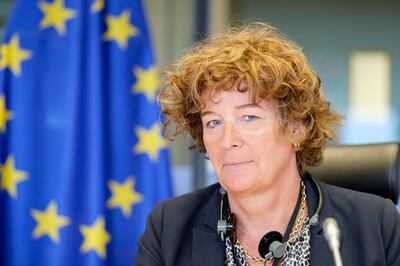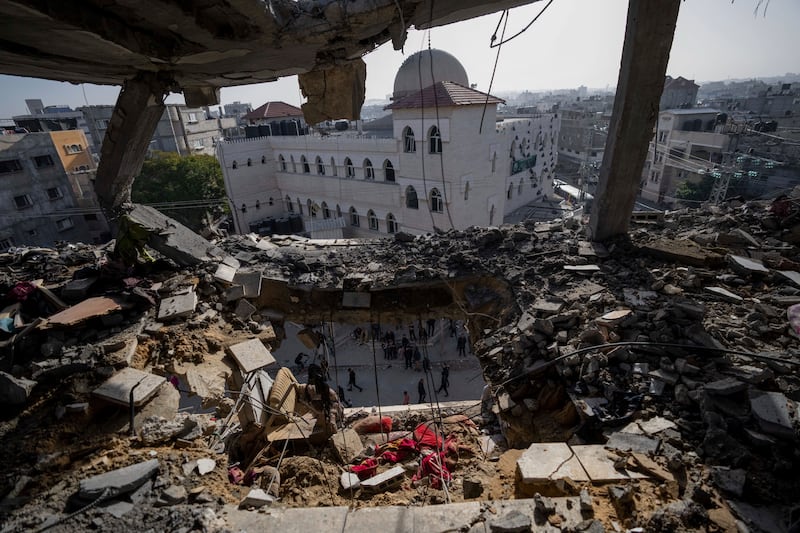Live updates: Follow the latest news on Israel-Gaza
The Belgian government on Wednesday asked its Foreign Affairs Ministry to examine a senior coalition member's call to back South Africa's genocide case against Israel at the International Court of Justice.
“We must act against the threat of genocide,” Deputy Prime Minister Petra de Sutter said on X. “I want Belgium to take action at the International Court of Justice, following the lead of South Africa.”
“The Foreign Affairs Ministry will first conduct a legal analysis and examine the position of other European countries,” said Sam De Paepe, spokesperson for Prime Minister Alexander De Croo's liberal Open VLD party.
“We will then decide what position to take,” Mr de Paepe told The National, which has contacted the ministry for comment.
It is unclear how long the analysis will take. Mr de Croo is travelling to China for the next three days and a decision is not expected until his return.
If the government agrees to follow Ms de Sutter's proposal, Belgium could become the first EU country to back the South African case.
It could choose to lodge its own case at the ICJ or join South Africa's complaint, which was filed in December.
Belgian political parties are divided on the Israel-Gaza conflict. Ms de Sutter is a member of the Flemish Green party and is supported in her call by the Flemish Socialists and the Christian Democrats' party, CD&V.
"This conflict is extremely fraught, so it is very important to judge based on facts. As an independent body, the International Court of Justice is best placed to investigate the risk of genocide," said CD&V MP and chair of the Parliament's federal affairs committee, Els Van Hoof.
The Open VLD opposed a proposal made in November by Ms de Sutter to boycott the import of goods produced in illegal Israeli settlements.
Other members of Mr de Croo's coalition government had not responded to The National at the time of publication.
The first hearings in the South African case, which alleges that Israel is committing genocide against Palestinians, are scheduled for Thursday and Friday.
Israeli bombardments and raids have killed more than 23,000 people in Gaza since October 7, according to local authorities.
Israel says it does its best to protect civilian lives. Israeli president Isaac Herzog has called the South African accusations “atrocious and preposterous”.
In a statement published on Instagram, Ms de Sutter pointed at Israel's blockade of Gaza, which prevents the arrival of food, medicine and fuel and has forced hospitals to operate without anaesthesia.
Most of the enclave's population has been displaced and it is not clear whether its inhabitants will be able to return.
“Representatives of the Israeli government refer to Palestinians as 'human animals', declare they will 'get hell' and threaten to 'eliminate everything',” Ms de Sutter said.
“Unimaginable, horrific acts. They disturb me as they do many of you. Under the Genocide Convention it is our duty to act once there is a risk of genocide.
“All those international treaties are valuable only when we abide by them,” she said.
In November, Ms de Sutter called on the Belgian government to sanction Israel.
Belgium has since said that it would ban extremist Israeli settlers from its territory but has not disclosed who it has targeted. The EU has not implemented similar measures.
Ms de Sutter has also condemned Hamas and called for the release of Israeli hostages detained by the group in Gaza since October 7.
No EU country has so far supported South Africa's case at the ICJ.

Earlier this week, Ireland's Prime Minister Leo Varadkar said his country would not back the case and warned of the need to be “very careful” about defining genocide.
Mr Varadkar has previously expressed some of the strongest criticism from EU leaders of Israel's military operation in Gaza and highlighted the West's “double standards” in the war.
The EU, which is historically deeply divided over the Israel-Palestine conflict, will probably not call for a ceasefire until the US does, Mr Varadkar said last month.
His comments on the South African case were echoed by UK Foreign Secretary Lord Cameron who said he did not think it was “helpful” or “right”.
“I don't think we should bandy around terms like genocide in this case, I don't think that's correct,” he told British legislators on Tuesday.
Countries that support the South African complaint include Malaysia, Turkey, Jordan and Bolivia, as well as the Organisation of Islamic Countries, which includes 57 member states.







